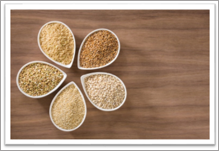Why whole grains are important and five cheap easy ways to get them
 What does whole grain really mean, and why is this important to your health? It can be so confusing when you’re trying to buy a loaf of bread or a box of cereal. There’s a lot to choose from; plus, the information on the boxes can be difficult to interpret. It’s hard to know what to value and what to prioritize.
What does whole grain really mean, and why is this important to your health? It can be so confusing when you’re trying to buy a loaf of bread or a box of cereal. There’s a lot to choose from; plus, the information on the boxes can be difficult to interpret. It’s hard to know what to value and what to prioritize. Here’s your whole grain lowdown to put you on the right track:
The basics:
It’s become common knowledge that food that is more processed tends to be less healthy, whereas food that remains closer to its natural state tends to be healthier. This is true for whole grains.
The Cleveland Clinic’s Health Essentials Newsletter explains: “In their original, unprocessed state, grains like wheat, oats, kasha and rice have outer layers or coats. These layers contain healthy vitamins, minerals and fiber as well as carbohydrates, some protein and healthy, unsaturated fats.”
There are three parts to each grain, the bran, the germ and the endosperm. To be considered whole grain, each of the three must be left fully intact. When grains are processed, the healthy outer layers are removed. While it makes the food less nutritious, it often makes it easier to store and sell. Sometimes, nutrients are then added back into the food. Products that are stripped and then artificially enhanced, earn the “enriched” label. But they don’t have the nutritional value they did when they were in their natural state.
This is unfortunate, because in their natural state, whole grains are rich with value. The Cleveland Clinic points out that “Whole grain benefits go beyond nutrition.” The clinic notes that whole grains can help reduce weight gain by making the stomach feel full longer. Whole grains help the digestive system and the heart. Plus, a diet that includes plenty of whole grains can also help prevent diabetes.
How to get your grains:
While this all sounds great, healthy foods tend to mean a heftier price tag. How can you get your whole grains and stick to your food budget for the month? Here’s five great grains that won’t break your bank.
Brown rice:
Brown rice is a powerful whole grain that’s inexpensive and delicious. Registered dietician Jillian Kubala writes, “Brown rice is highly nutritious, providing the body with a wide array of vitamins, minerals and antioxidants.” Keep in mind that brown rice maintains these qualities even if you buy it in the convenient, microwavable portions or if you buy frozen brown rice. This makes preparation a snap!
Oatmeal:
Oats are a healthy whole grain, but it can be confusing to make sense of all the different varieties that are available. The good news is that all of them have robust health benefits and are considered a whole grain choice - even instant oatmeal. Just be aware, if you go this route, that some varieties can have a lot of added sugar. It’s a better strategy to buy a plain variety and add you own nuts, honey and dried fruits. This way, you get to control what’s added.
Also, keep in mind, if you ever have questions about what qualifies as a whole grain food, the Whole Grain Council has a helpful tool to help you identify these foods and the percentage of healthy benefits they contain.
Popcorn:
Great news: popcorn is a healthy, whole grain food! You want to be careful, though, of what’s added to it. Extra fat, butter and oil can curb some of its healthy benefits. The healthiest way to prepare popcorn is by air popping it.
Barley: Barley is wholegrain, delicious and packed with healthy benefits. It’s also affordable and easy to prepare. Consider tossing a handful into the soups and stews you make. It adds great texture and flavor; plus, it enhances the nutritional composition.
Quinoa:
Quinoa may seem like a trendy new food that’s been popping up all over in recent years, but it’s actually an ancient grain with a long history in South America. Quinoa is rich with healthy benefits. It’s easy to prepare, and it’s versatile. If you have not tried it, it’s worth your attention and experimentation!
Remember:
The foods you select have a tremendous impact on your wellness. Everyday we get a new opportunity to make great choices and treat ourselves well. Enjoy!
Is your aging loved one finding it difficult to meal plan and prepare healthy meals? Our Visiting Angels Chapel Hill NC caregivers assist clients with activities of daily living, which may be difficult or dangerous for the client to perform on their own. These activities include personal activities, like dressing and bathing, as well as homemaking tasks, like meal preparation and light housekeeping. With Visiting Angels Chapel Hill NC, you can rest assured that your loved one is receiving the care they need. Give us a call today to learn more 919-968-3724.
